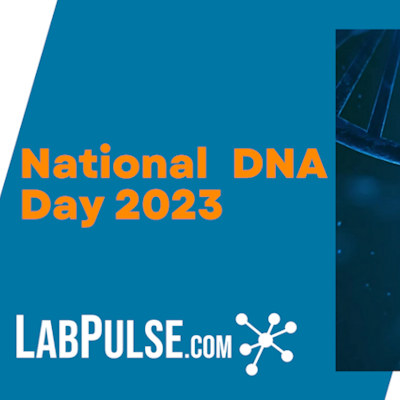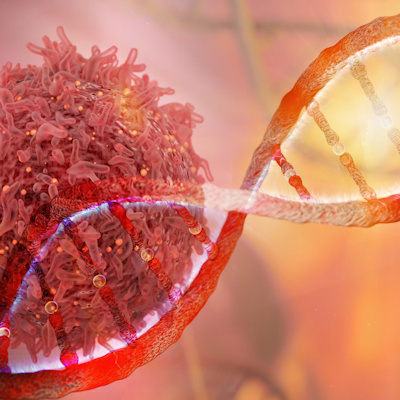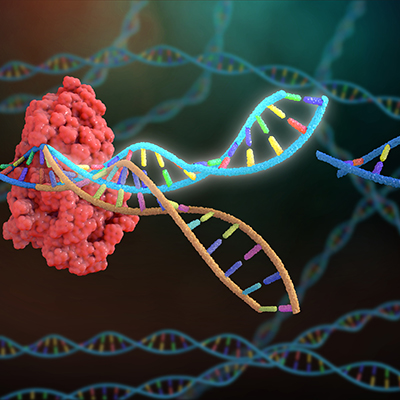 Scanning ion conductance spectroscopy in study enables precise DNA identification
Scanning ion conductance spectroscopy in study enables precise DNA identification
Researchers at the Ecole Polytechnique Fédérale de Lausanne (EPFL) have developed a new nanopore approach for manipulating individual molecules such as DNA that allows unprecedented control and precision. Read More
 Benchtop DNA printing on DNA Day
Benchtop DNA printing on DNA Day
Geared up for DNA Day on April 25, Sylvain Gariel, co-founder and chief operating officer of DNA Script, spoke to Stephen Wellman, director of content and strategy of LabPulse and The Science Advisory Board, about DNA’s impact on diagnostics, genomics, and molecular biology research. Read More
 Cellecta releases NGS assays for T-cell and B-cell receptor chains
Cellecta releases NGS assays for T-cell and B-cell receptor chains
Genomics company Cellecta announced on Wednesday that it has launched its DriverMap Adaptive Immune Receptor DNA (AIR-DNA) TCR and BCR kits that provide rapid, single-tube polymerase chain reaction (PCR) analysis of the variability of T-cell and B-cell receptor chains from a range of sample types, including tissue biopsy, whole blood, purified immune cells, and others. Read More
 Prenetics acquiring majority stake in ACT Genomics, expanding position in cancer genetics, precision oncology
Prenetics acquiring majority stake in ACT Genomics, expanding position in cancer genetics, precision oncology
Hong Kong-based Prenetics Global, a genomics and diagnostic testing firm, on Friday announced that it is acquiring a majority stake in Taiwan-based precision oncology firm ACT Genomics. Read More
 New AI tool discovers mutations linking bladder cancer to tobacco smoking
New AI tool discovers mutations linking bladder cancer to tobacco smoking
Using a new artificial intelligence (AI) tool, University of California, San Diego researchers contend they have for the first time uncovered a pattern of DNA mutations that links bladder cancer to tobacco smoking. Read More
 Boosting TERRA levels damages DNA of hard-to-kill cancer cells: study
Boosting TERRA levels damages DNA of hard-to-kill cancer cells: study
Increasing levels of telomeric repeat-containing RNA (TERRA) damages the DNA of cancers with a particular form of replicative immortality and leads to cell death, according to Portuguese researchers who show that “anti-aging clocks” can be used to kill cancer cells. Read More
 Harvard’s Wyss Institute spins out protein detection technology to create Spear Bio
Harvard’s Wyss Institute spins out protein detection technology to create Spear Bio
The Wyss Institute for Biologically Inspired Engineering at Harvard University has licensed technology for detecting proteins in small patient samples to a newly formed startup. Read More
 Discovery of widespread DNA damage in stem cell lines spurs call for pre-use sequencing
Discovery of widespread DNA damage in stem cell lines spurs call for pre-use sequencing
More than 70% of stem cell lines derived from human skin cells have damage to their DNA that could compromise their use in research and cell-based therapies, according to a study published August 11 in Nature Genetics. Read More
 CRISPR-Cas9 gene editing can give rise to cell toxicity, genomic instability: study
CRISPR-Cas9 gene editing can give rise to cell toxicity, genomic instability: study
Gene editing using CRISPR-Cas9 can lead to cell toxicity and genome instability depending on the targeted spot of the human genome, according to a new study by researchers at the Institute for Research in Biomedicine Barcelona. Read More
 NIH team creates 3D structure of twinkle protein, sheds light on mitochondrial diseases
NIH team creates 3D structure of twinkle protein, sheds light on mitochondrial diseases
Researchers from the National Institutes of Health (NIH) have used cryo-electron microscopy and other techniques to create a 3D structure of the twinkle protein, the final piece of the human minimal mitochondrial replisome to be structurally characterized. Read More
Conferences
Science Briefs
Member Rewards
Earn points for contributing to market research. Redeem your points for merchandise, travel, or even to help your favorite charity.
Research Topics
Interact with an engaged, global community of your peers who come together to discuss their work and opportunities.
Connect
Tweets by @ScienceBoard






